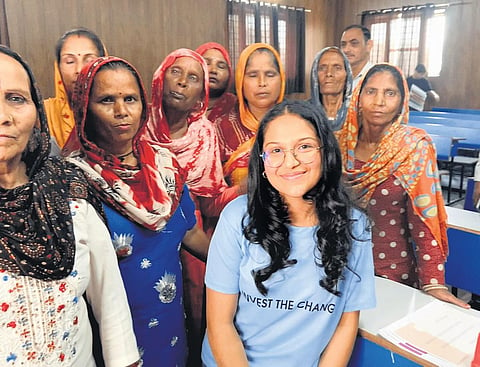

Guardian angels come in all shapes and sizes.
Kanta Devi, a 30-year-old housekeeping staff at a popular Dehradun school, wishes she had met hers last year. She is referring to Kashvi Jindal, a teenaged girl, who is studying for a business degree. Devi’s husband met with an accident in early 2023, which forced her, a mother of two, to spend a fortune on his trauma care. But she lost him, and what little savings she had.
Had she met Jindal then, the teenaged activist would have taken Devi through the steps needed to register for the Pradhan Mantri Suraksha Bima Yojana (PMSBY). Devi would have gotten Rs 2 lakh to meet the expenses for her husband’s accident treatment, or death, for a premium of as little as Rs 20 a year.
The spirited Jindal girl wants to launch a platform/mobile app, which will compile a database of the needy, and map it to available schemes. The poor, and often uneducated, blue-collar workers know little about the free government schemes available for disadvantaged people, and how these can be used to their advantage. So far, the 17-year-old has enrolled 3,000 beneficiaries; benefits of Rs 20 crore has been disbursed in 1.5 years alone.
The turning point came during the pandemic, when she witnessed the financial distress faced by housekeeping staff working in her apartment complex. “I did extensive research on government schemes designed for their welfare,” she adds. In July 2022, Jindal was selected for the Wharton Global Youth Program of the University of Pennsylvania where she learned problem-solving skills. She understood that people feel overwhelmed at the thought of downloading apps, typing in OTPs and scanning documents such as Aadhaar with their phone camera. “It prompted me to connect with them through workshops and sessions and guide them through the tedious process. Recognising the language barrier faced by many migrant workers, I deployed volunteers—she reaches out to them on social media—who could communicate in regional languages,” she shares.
The app will filter scheme-related queries based on age, region, income brackets and eligibility, presented in audio format in regional languages. She uses her social networks in other cities to connect to schools and colleges, which can offer her their auditoriums for a few hours during weekends. Drivers, cleaning staff, housekeeping staff, maids and waiters form her typical audience at such events. “A human connection between the programmes and the beneficiary is crucial,” she stresses as she gets back to working on her app.